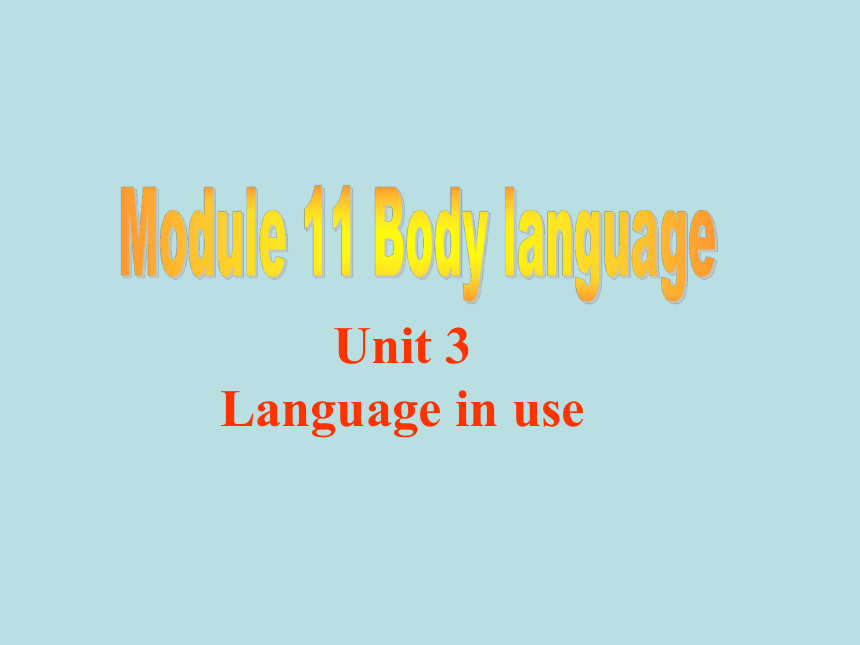(
课件网) Unit 3 Language in use Language practice Give them more personal space. Wave to say goodbye. Be careful! Don’t stand too close to North Americans. 一、定义:祈使句用来表达叮嘱、劝告、希望、禁止、警告、请求或命令等。祈使句最常用来表达命令,因此又叫做命令句。 Go and wash your hands. 快去洗手。 (命令) Be quiet, please. 请安静。 (请求) Be kind to our sister. 要对我们的妹妹友善。 (劝告) Watch your steps. 走路小心。 (警告) No littering. 不要乱扔垃圾。 (禁止) Don’t forget to take an umbrella. 不要忘了带雨伞。 (叮嘱) 二、祈使句的特点: ◇ 祈使句一般没有主语,说话的对象都是第二人称“你”或“你们”,所以也可以理解为省略了主语you。 ◇ 在表达请求时,可以加上please;表达比较强烈的语气时,可以用感叹号。 eg: Please close the door. 请把门关上。 Sit down, please. 请坐。 三、祈使句的结构: ◇肯定形式:以动词原形开头,无时态和数的变 化。 Stop! 停! Hurry up! 快点! Please don’t do it.请不要这么做。 表现形式 ———��肯定结构: 动词原形(+宾语)+其它成分。组卷网 如:Please have a seat here. 请这边坐。 即:Be + 表语(名词或形容词)+其它成分)。 如:Be a good boy! 要做一个好孩子! 即:Let + 宾语 + 动词原形 + 其它成分)。 如:Let me help you. 让我来帮你。 1) Do型———动词原形开头 : 2)Be型———动词Be开头 3) Let型———动词Let开头 三、祈使句的结构: ◇否定形式: 1、祈使句的否定形式是在动词原形前加don’t。 2、No+名词或 动词-ing,用来表示禁止性的祈 使句。 Don’t be late again. 不要再迟到了。 No smoking.禁止吸烟! 1. Work in pairs. Talk about do’s and don’ts in a foreign country. Britain Do’s Stand in line. Shake hands. Say ‘please’ and ‘thank you’. Open doors for others. Look at people when you talk. Be on time. Britain Don’ts Touch people. Ask a woman’s age. Stand too close. Say anything too personal. 3. Rewrite the sentences. Eg. It’s important to listen to the teacher. Listen to the teacher. You cannot shout in the classroom. Don’t shout in the classroom. 1. It’s important to be careful. 2. It’s important to clean and tidy the lab. 3. You cannot touch anything if the teacher doesn’t ask you to. 4. You cannot bring food or drink into the lab. 5. You cannot enter the lab alone. Be careful. Clean and tidy the lab. Don’t touch anything if teacher isn’t ask you to. Don’t bring food or drink into the lab. Don’t enter the lab alone. Answer the questions. Use the words and expressions from the box to help you. all right arm in arm close different hold on to kiss three times point at shake hands with wave 1.How do the British say hello to each other when they first meet 2. Does body language mean the same thing in different countries They shake hands with each other. No , it doesn’t. 3. How do the Russians say hello to each other when they meet 4. Is it polite to stand close to North Americans 5. Is it all right to wave goodbye in Greece 6. How do you usually say goodbye with body language They usually kiss three times. No ,it isn’t. No ,it isn’t. I wave my hand. How do children in Japan show ... ...

